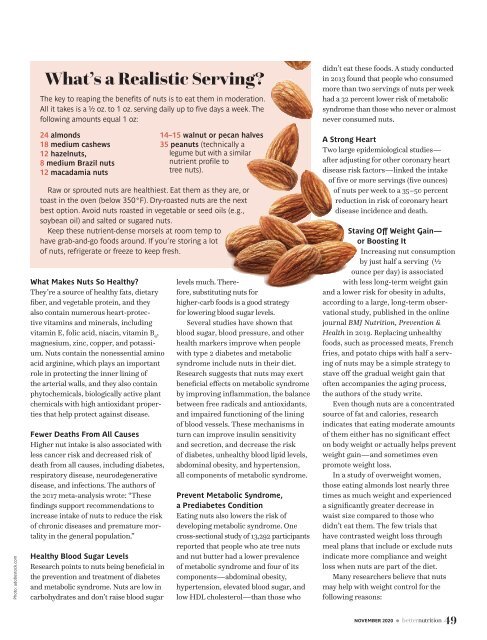Better Nutrition November 2020
You also want an ePaper? Increase the reach of your titles
YUMPU automatically turns print PDFs into web optimized ePapers that Google loves.
What’s a Realistic Serving?<br />
The key to reaping the benefits of nuts is to eat them in moderation.<br />
All it takes is a ½ oz. to 1 oz. serving daily up to five days a week. The<br />
following amounts equal 1 oz:<br />
didn’t eat these foods. A study conducted<br />
in 2013 found that people who consumed<br />
more than two servings of nuts per week<br />
had a 32 percent lower risk of metabolic<br />
syndrome than those who never or almost<br />
never consumed nuts.<br />
Photo: adobestock.com<br />
24 almonds<br />
18 medium cashews<br />
12 hazelnuts,<br />
8 medium Brazil nuts<br />
12 macadamia nuts<br />
What Makes Nuts So Healthy?<br />
They’re a source of healthy fats, dietary<br />
fiber, and vegetable protein, and they<br />
also contain numerous heart-protective<br />
vitamins and minerals, including<br />
vitamin E, folic acid, niacin, vitamin B 6<br />
,<br />
magnesium, zinc, copper, and potassium.<br />
Nuts contain the nonessential amino<br />
acid arginine, which plays an important<br />
role in protecting the inner lining of<br />
the arterial walls, and they also contain<br />
phytochemicals, biologically active plant<br />
chemicals with high antioxidant properties<br />
that help protect against disease.<br />
Fewer Deaths From All Causes<br />
Higher nut intake is also associated with<br />
less cancer risk and decreased risk of<br />
death from all causes, including diabetes,<br />
respiratory disease, neurodegenerative<br />
disease, and infections. The authors of<br />
the 2017 meta-analysis wrote: “These<br />
findings support recommendations to<br />
increase intake of nuts to reduce the risk<br />
of chronic diseases and premature mortality<br />
in the general population.”<br />
Healthy Blood Sugar Levels<br />
Research points to nuts being beneficial in<br />
the prevention and treatment of diabetes<br />
and metabolic syndrome. Nuts are low in<br />
carbohydrates and don’t raise blood sugar<br />
14–15 walnut or pecan halves<br />
35 peanuts (technically a<br />
legume but with a similar<br />
nutrient profile to<br />
tree nuts).<br />
Raw or sprouted nuts are healthiest. Eat them as they are, or<br />
toast in the oven (below 350°F). Dry-roasted nuts are the next<br />
best option. Avoid nuts roasted in vegetable or seed oils (e.g.,<br />
soybean oil) and salted or sugared nuts.<br />
Keep these nutrient-dense morsels at room temp to<br />
have grab-and-go foods around. If you’re storing a lot<br />
of nuts, refrigerate or freeze to keep fresh.<br />
levels much. Therefore,<br />
substituting nuts for<br />
higher-carb foods is a good strategy<br />
for lowering blood sugar levels.<br />
Several studies have shown that<br />
blood sugar, blood pressure, and other<br />
health markers improve when people<br />
with type 2 diabetes and metabolic<br />
syndrome include nuts in their diet.<br />
Research suggests that nuts may exert<br />
beneficial effects on metabolic syndrome<br />
by improving inflammation, the balance<br />
between free radicals and antioxidants,<br />
and impaired functioning of the lining<br />
of blood vessels. These mechanisms in<br />
turn can improve insulin sensitivity<br />
and secretion, and decrease the risk<br />
of diabetes, unhealthy blood lipid levels,<br />
abdominal obesity, and hypertension,<br />
all components of metabolic syndrome.<br />
Prevent Metabolic Syndrome,<br />
a Prediabetes Condition<br />
Eating nuts also lowers the risk of<br />
developing metabolic syndrome. One<br />
cross-sectional study of 13,292 participants<br />
reported that people who ate tree nuts<br />
and nut butter had a lower prevalence<br />
of metabolic syndrome and four of its<br />
components—abdominal obesity,<br />
hypertension, elevated blood sugar, and<br />
low HDL cholesterol—than those who<br />
A Strong Heart<br />
Two large epidemiological studies—<br />
after adjusting for other coronary heart<br />
disease risk factors—linked the intake<br />
of five or more servings (five ounces)<br />
of nuts per week to a 35–50 percent<br />
reduction in risk of coronary heart<br />
disease incidence and death.<br />
Staving Off Weight Gain—<br />
or Boosting It<br />
Increasing nut consumption<br />
by just half a serving (½<br />
ounce per day) is associated<br />
with less long-term weight gain<br />
and a lower risk for obesity in adults,<br />
according to a large, long-term observational<br />
study, published in the online<br />
journal BMJ <strong>Nutrition</strong>, Prevention &<br />
Health in 2019. Replacing unhealthy<br />
foods, such as processed meats, French<br />
fries, and potato chips with half a serving<br />
of nuts may be a simple strategy to<br />
stave off the gradual weight gain that<br />
often accompanies the aging process,<br />
the authors of the study write.<br />
Even though nuts are a concentrated<br />
source of fat and calories, research<br />
indicates that eating moderate amounts<br />
of them either has no significant effect<br />
on body weight or actually helps prevent<br />
weight gain—and sometimes even<br />
promote weight loss.<br />
In a study of overweight women,<br />
those eating almonds lost nearly three<br />
times as much weight and experienced<br />
a significantly greater decrease in<br />
waist size compared to those who<br />
didn’t eat them. The few trials that<br />
have contrasted weight loss through<br />
meal plans that include or exclude nuts<br />
indicate more compliance and weight<br />
loss when nuts are part of the diet.<br />
Many researchers believe that nuts<br />
may help with weight control for the<br />
following reasons:<br />
NOVEMBER <strong>2020</strong> • 49

















